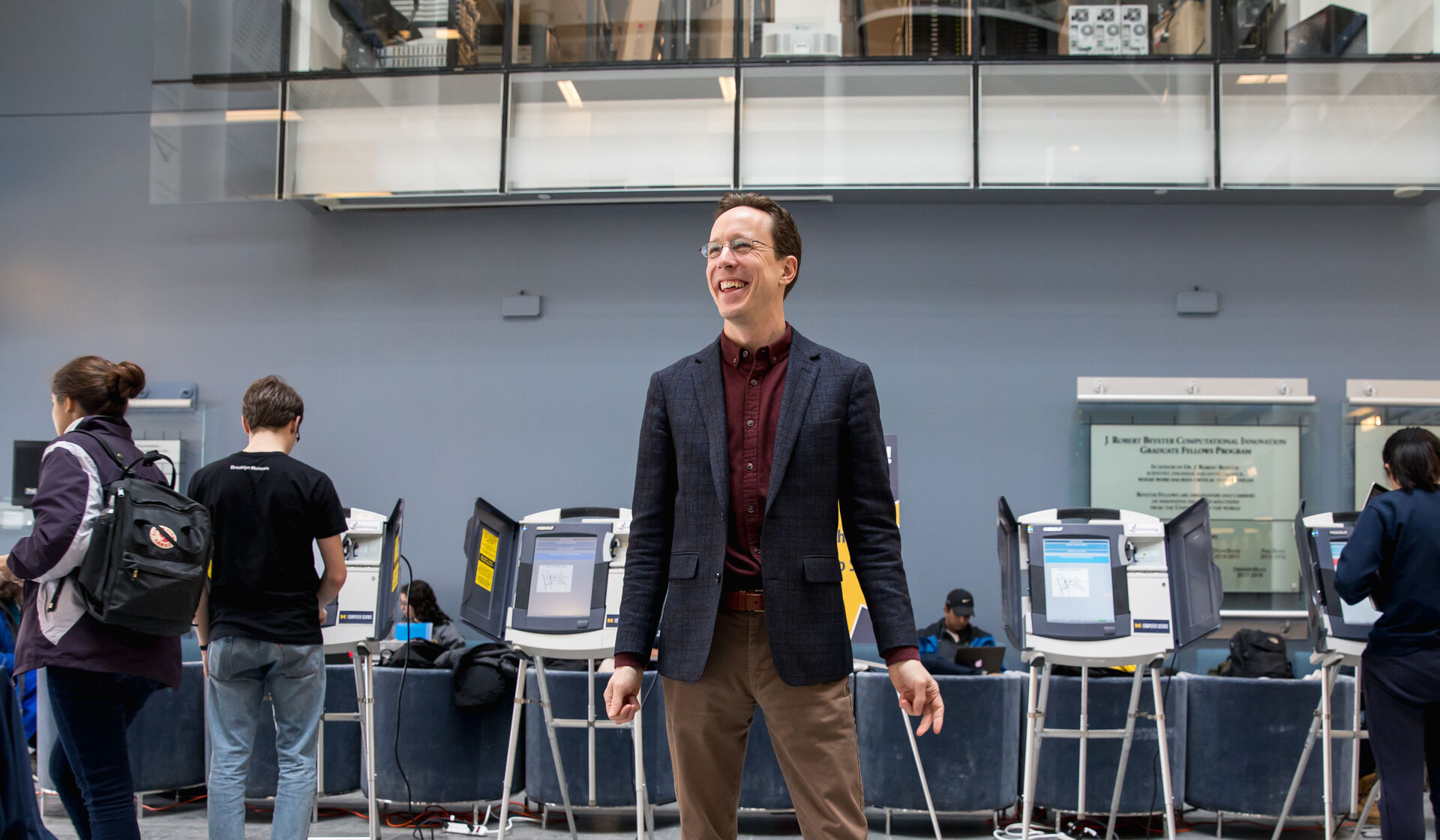Chris Vrenna is a producer, composer, Rock and Roll Hall of Fame inductee, and the Grammy award-winning former drummer of Nine Inch Nails. He is also a video game composer whose credits include Doom 3, Quake 4, and Call of Duty: ExoZombies. Vrenna joined the faculty of the School of Music, Theatre & Dance this fall as an assistant professor of performing arts technology. Michigan Alum spoke to Vrenna about his industry experience and the courses he is teaching at U-M.
You have taught music technology courses before, but what brought you to U-M?
My dad went to the University of Michigan for grad school. I grew up a hardcore Michigan Wolverines fan — those Saturday afternoon games and watching the two gigantic marching bands. The only thing I’ll give Ohio State credit for is dotting the “I” with the tuba player. That’s pretty cool, as a former marching band and drum corps geek.
When I was starting to interview again, I knew that Michigan would be my dream gig, and they just happened to have an opening in this very niche field that I teach. I guess it was just destiny.
I never thought I would end up teaching. It never really crossed my radar. I dropped out of college at Kent State when Nine Inch Nails’ first single, “Down in It,” got added to MTV. I always liked learning so in between the Pretty Hate Machine tours, I actually went back to Kent for a semester. When I got into teaching in 2013, I went back to Kent State online and finished my degree. I’m glad I did because now look at me: I’m at Michigan.
For those who are not part of the music industry, how do you explain the way these courses help prepare students for careers in performing arts technology?
People ask me all the time what I teach, and I tell them music tech. At Michigan, they call it performing arts technology. It’s everything that has to do with audio. That could be producing albums, mixing albums, going on tour and mixing sound for what you see in the middle of the arena. It’s every sound effect, every dialogue, everything you hear in video games and movies — recording it, editing it, mixing it. If you’re listening or watching something and you’re hearing something, that is what we do.
One of the courses you’re teaching, Sound for Film and Games, you renamed and wrote a new course description. What is new about this course that you’ll be teaching?
Previously, it was more music composition-based rather than technical and covering all aspects of audio. But film and games, those two industries are massive now — way, way outpacing what the music industry has now become. They all have their different sets of requirements and techniques for creating sound design.
Scoring a film and scoring a video game are completely different. A movie is a 100% locked, frame-accurate, edited story. It’s not going to change. A video game is unique to every player, it doesn’t play the same way even for the same player. So you cannot have music that is linear and just playing because it doesn’t mean anything. It has to be interactive. Those are the types of skills that we’ll be covering in that class.
We’ll talk about how you create sound design from scratch. Pre-made sound effect libraries are a dime a dozen and most projects will want unique sounds. They don’t want a sound effect in their game or movie and then you hear the same sound elsewhere.
Lastly, we’ll be talking about surround sound. Games broke into the spatial audio surround sound. If you’re in a game like Call of Duty, in your headphones, you hear footsteps coming up from behind you on the left side, you need to be able to localize that so that you can turn and shoot. Having spatial audio is important in games and now in movies, like getting that experience of TIE fighters flying overhead in Star Wars — there’s actually speakers in the ceiling that are discreet channels that can do that. It’s important to understand how that all works and experiment with it.
One of the courses you’re teaching, Sound Recording and Production, is not a new course, but is there anything that you’re planning on doing differently?
Being in the industry as long as I have, I do believe in a theoretical background. There are certain sciences to what we do and that science doesn’t change whether you fancy yourself a jazz recordist or you want to make Taylor Swift albums. We all have to have that background. Once you have that, then it can be applied to everything else.
Nine Inch Nails was based on wacky recording techniques. But you have to know the rules in order to break them.
The other thing that I’m really big on is the recording studios [at the School of Music, Theatre & Dance] are just incredible, state-of-the-art recording studios. Maybe you get to work in a studio like that, or sometimes you won’t.
I use the term ‘scalable.’ I don’t want students thinking, ‘I can’t get into the API room, so I can’t do this project.’ Yes, you can. You can do it in your dorm room with one microphone. It’d be nice if we could all drive Ferraris and Bugattis. Sometimes you have to drive a ’92 Honda Prelude. It’s still just a car at the end of the day.
Making “March of the Pigs” for Nine Inch Nails, there were two microphones on the drum kit. That’s what gives it that weird garage-y kind of lo-fi sound. I like to teach everything so that it can be scaled up when you’re in a big room or scaled down and you use your imagination to get across what it is you are hearing in your head.
The second thing I drill into students is what we do is incredibly interpersonal communication-based. You’re in one of those recording studios and it’s a group dynamic. So we need to get you off your screens, look at people, share ideas, don’t be afraid to raise your hand and say, ‘I don’t know if that sounds that good.’ You quickly have to build a thick skin, learn how to take criticism and learn how to give it constructively.
One time we were doing a first recording of a vocal idea that an artist had. He was throwing down ideas. He likes to write in the studio and capture everything as he’s reading through notebooks and poetry, that’s just his process. I edited some stuff together and a bandmate said something negative to him and it ruined his confidence as he was trying to create. You have to learn how to say something that doesn’t send your singer into a downward spiral, no pun intended.
How does your career experience influence the way you develop and teach these courses?
I started playing drums when I was six. I was in bands in high school. When Nine Inch Nails’ first record came out, Pretty Hate Machine, I was 21. I’ve been doing this a really long time, and I have a lot of industry experience. I’d like to think that I kind of know what I’m talking about, because I have an entire 30-year career that landed me in the Rock and Roll Hall of Fame, so I must be doing something okay.
I always tell students, ‘If I’m telling you this or it feels like I’m just going on and on, it’s because I know this is important.’ Everything I teach comes grounded in experience.
Soft skills tend to get overlooked quite a bit. I was in one of my big bands and we needed a bass player for a tour. We didn’t hold open auditions. We were given a recommendation by somebody that we trusted and he was young and had never been in a big band, but a great player. We fired him after six months because his personality was so horrible and he would not take direction.
In that particular case, it didn’t matter about hard skill. His soft skills were just awful. I tell that story to all my classes. You may be the world’s best ProTools programmer, but if nobody wants to be locked into a studio with you 12 hours a day, five days a week, it does not matter how good you are. If you can get the job done but more importantly, get along with everybody, you’ll get hired over and over.
I’ve seen people rising the ladder, just stepping on people, but eventually they start sliding down. The music industry seems huge, but it is small and it’s very word of mouth. You want your reputation to always be great.
Are there any trends that you’re taking from the performing arts technology industry right now that you’re bringing into these courses or that are important for you to cover in the courses?
The surround sound, spatial audio, Dolby Atmos — there are different names people use. From a technological standpoint, that is something that we’re all going to have to start looking into.
ProTools is the big industry standard. I am going to be bringing more Pro Tools into my classes because they just have to know it. They also have spatial audio and Dolby Atmos now built into ProTools. I will be adding lessons on that so that they can at least feel comfortable for now. They will see it everywhere, especially if you want to go into film and games.
Those would be the two big tech things that I want to make sure have a bit of focus.
Beyond the curriculum, what are you hoping students take away from their time with you as a professor?
It’s a half-joke, but I will always say this: If all they get out of my classes is a bunch of my stories that kind of guide them into what not to do in the industry, it’s a success.
For as much good as I’ve had, there’s been some awful things that happened to me as well. Everybody makes everything seem like it’s unicorns and rainbows. And then behind the unicorn and rainbows is the Death Star just waiting to blast you into a bazillion pieces. Nobody really wants to share those stories, but I’m transparent. If somebody asks something that I really don’t want to talk about, I’ll tell them that, but otherwise I’m pretty much an open book.
I don’t know how many people have lived through some stuff I’ve lived through. That is one reason I got into teaching when I got out of Los Angeles and got myself sober, going on 10 years now. I started thinking about what I wanted to do with the rest of my life. Drumming is brutal on the body, and I blew out a rotator cuff twice. In the decade when my career took off, and I got to sit next to some of the most famous and best producers, musicians, and bands for years and years and I got to be a sponge and ask questions, collaborate, and learn.
If a student cares about this art form of audio as much as I do and they’re willing to spend a lot of time and a lot of money to try to go somewhere and learn it properly, I think it’s actually my duty to try to help with that, give them what I was given from the people I respected.
The first time I got to work with my all-time favorite producer I couldn’t believe I was in the room with this guy. And if I could be that on a smaller scale for a young person, I feel that is where I need to go and help and carry on that learning. I am so excited and honored to get to do that here at the University of Michigan. Go Blue!





